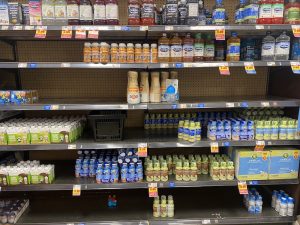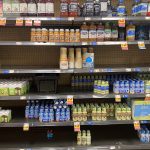Last month, Nestle, a Swiss multinational food and drink processing corporation, announced a voluntary recall of its Toll House Chocolate Chip Cookie Dough “break and bake” bar because some of the products contained wood fragments.
Some customers had contacted Nestle to inform the company of the presence of the objects in the bars. According to Daily Mail, although wood fragments may not always cause major problems if consumed, they could lead to infections. “Sharper pieces of wood could damage internal organs of the digestive system, including the throat, tongue, and intestines among others.”
In a press release, Nestle said that while no illnesses or injuries have been reported, it issued the recall ‘out of an abundance of caution.’ It said the products being recalled were produced between April 24-25, 2022 with the the batch codes 311457531K and 311557534K. The products were said to be in various U.S. markets and stores where they were distributed.
“We are confident that this is an isolated issue and we have taken action to address it. The quality, safety, and integrity of our products remain our number one priority. We sincerely apologize for any inconvenience this action represents to both our consumers and retail customers,” the release said.
Many U.S. and foreign companies recall products daily once they sense danger in their products, which include foods, beverages, cosmetics, medical services, vehicles, laundry products, and electronics, among many others. There has been a significant increase in product recalls in the United States, especially in the food and pharmaceutical categories. This is due to increased regulations and aggressive enforcement strategies from the enforcement agencies.
What the numbers say about product recalls
In its 2022 recall index report, Sedgwick, a third-party claims administrator, said about 1.5 billion units of food, drugs, medical devices, automobiles, and consumer products were recalled in the U.S. This happened to be the the second consecutive year that the 1 billion threshold was exceeded, and only the third time in the last 11 years.
“2023 may shape up to be another 1 billion unit year, requiring businesses across industries to remain vigilant on matters of product safety and recall preparedness,” the report said.
Of the 1.5 billion units recalled across all sectors, the number of food units recalled in 2022 increased by more than 700% compared to 2021 and pharmaceutical units recalled surged over 114%, Property Casualty 360 reported.
Data from Sedwgwick’s 2023 Edition 1 Recall Index shows that product recalls across the U.S. automotive, consumer product, food and beverage, medical device, and pharmaceutical industries increased by 14.2% from the previous quarter. The report revealed the 863 product recalls in Q1 2023 marked the highest single-quarter total in four years.
Recalls often happen because of complaints from customers who have observed significant side effects of the products that may be injurious or deadly to the consumers. Sometimes, the manufacturers notice some issues with their products and recall them.
Kellerman Consulting co-founder and food-safety expert Brian Kellerman said product recalls are part of the United States government oversight. He said one of the main functions of the Food and Drug Administration (FDA) and the Food Safety and Inspection Service of the United States Department of Agriculture is to regulate food products and oversee product recalls.
The FDA, a federal agency under the Department of Health and Human Services, has industry standards governing product recalls. FDA drafted guidelines for all manufacturers and companies to follow to ensure there is a smooth process in product recalls.
The FDA product recall guidelines are intended to help FDA-regulated industries such as food and drugs regarding what information companies should provide to the FDA and how they should notify their customers about product recalls.
The United States Consumer Product Safety Commission (CPSC) is another independent agency of the United States government that promotes the safety of consumer products by addressing unreasonable risks of injury. While the CPSC does not have a model recall plan, it has provided a handbook on product safety planning to highlight important issues for a firm to incorporate into its recall plan.
Product recalls help to raise awareness of harmful products in the market and ensure customers who have purchased them get notified and immediately return them to the companies or manufacturers.
But there’s also the risk of legal action, especially when recalls aren’t announced immediately. Online professionals from ClassAction.org have been reporting lawsuits filed by lawyers on products. The platform also enables consumers to file claims which are picked by lawyers to help consumers sue companies and get compensation for the negative effects of products they purchased.
For example, ClassAction in 2021 reported various lawsuits claiming that the makers of certain Similac and Enfamil infant formula products failed to warn healthcare providers and caregivers that ingesting cow’s milk-based formulas can cause premature babies to develop necrotizing enterocolitis (NEC), which is a dangerous and potentially fatal gastrointestinal disease.
According to ClassAction, “Lawsuits are now being filed that claim two makers of baby formula products, Mead Johnson and Abbott Laboratories, knew and failed to warn hospitals, doctors and caregivers that their cow’s milk-based infant formulas can significantly increase the risk that premature babies will develop potentially fatal NEC.”
The lawyers intend to help parents whose children developed the disease to be financially compensated for pain and suffering, loss of life’s enjoyment, the costs of medical care, and funeral expenses, among others.
Why business journalists should report product recalls
Product recalls might seem mundane but even beyond the public safety imperative in reporting them, they often lead to other important business stories.
Kellerman said the United States has a very safe food supply system that is overseen by various government agencies but wants journalists to investigate further to find out what leads to recalls and whether there have been any injuries or harm to consumers and not just reporting press releases.
“Recalls are done every day and the system is well managed. But there are instances of products that were supposed to be recalled and were not and people became sick and died from it,” he said.
Trievr, a recall management firm, said that factors such as reported injuries, damages, and death, how widespread the problem is, and how popular the product is, should determine why the media should report product recalls.
There are various ways in which business journalists can find product recall information to report on and inform the public about the need to stop the use of products.
Where to find product recall story ideas
Press releases
Press releases are written and distributed to media organizations when products are recalled. That is usually one of the first steps companies take to recall products.
“The press releases are required in the industry by the government,” said Kellerman. “The companies generally have to present press releases to the government as part of the approval of the recall plan.”
It is always advisable for journalists to follow up with the companies to clarify further information in the report that will enable them to write the stories better and inform the people accordingly.
Government agencies
United States consumer regulatory agencies such as the FDA and the CPSC are excellent sources for business reporters to get information on product recalls.
According to the law establishing the FDA, it is responsible for the protection of public health by ensuring the safety, efficacy, and security of human and veterinary drugs, biological products, medical devices, our nation’s food supply, cosmetics, and products that emit radiation.
The FDA is governed by the Food Safety Modernization Act, which stipulates steps the FDA needs to take to test products before they are allowed into the markets. It carries out product sampling, and environmental and emergency sampling to ensure products are safe to be used before being launched in various markets.
FDA publishes on its website information about product recalls relating to food and medical services. It also published press announcements to manufacturers on its website regarding issues of concern. while the CPSC is a regulatory agency that ensures the reduction of unreasonable risk of injuries and deaths associated with consumer products.
Recalls.gov, a U.S. government website, also posts timely information about product recalls relating to vehicles, medicine, food, cosmetics, consumer products, cosmetics, and environmental products to help American U.S. residents know about products that have been recalled.
Created by six federal agencies with vastly different jurisdictions, the website aims to provide better service in alerting the American people to unsafe, hazardous, or defective products.
Social media
Social media have become important platforms where journalists source reliable information to publish. Platforms such as Facebook, X (formerly known as Twitter), and LinkedIn have become instrumental in improving the day-to-day operations of the media. Business reporters can source information on product recalls on these platforms.
Social media platforms are also good for reporters to find and interview victims of product recalls. Some people post their daily live experiences on social media platforms and journalists can spot the posts when researching victims of product recalls.
Kellerman urged companies to improve their products to avoid future recalls.
“I like to see more testing and analyses done by companies during productions. I would like to see people testing the products and some sort of measurement of how their equipment works and what their products are. I would like to see more food businesses with better quality control,” he said.










